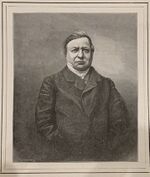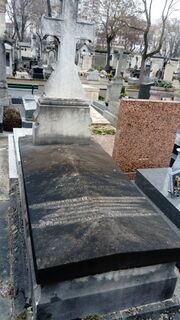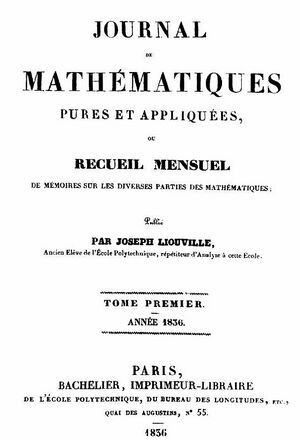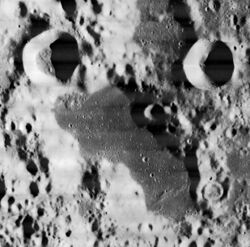جوزيف ليوڤيل
جوزيف ليوڤيل | |
|---|---|
Joseph Liouville | |
 | |
| وُلِدَ | 24 مارس 1809 |
| توفي | 8 سبتمبر 1882 (aged 73) |
| المثوى |  قبر جوزيف ليوڤيل في مقبرة مونپارناس |
| الجنسية | فرنسي |
| المدرسة الأم | إيكول پوليتكنيك |
| اللقب | Sturm–Liouville theory Liouville's equation Liouville's theorem (complex analysis) |
| السيرة العلمية | |
| المجالات | الرياضيات |
| الهيئات | École Centrale Paris إيكول پوليتكنيك |
| المشرف على الدكتوراه | Siméon Poisson لوي جاك ثينار |
| طلاب الدكتوراه | Eugène Charles Catalan Nikolai Bugaev |
جوزيف ليوڤيل Joseph Liouville FRS FRSE FAS ( /ˌliːuːˈvɪl/; بالفرنسية: [ʒɔzɛf ljuvil]; 24 مارس 1809 – 8 سبتمبر 1882)[1][2] كان عالم رياضيات ومهندس فرنسي.
الحياة والعمل
He was born in Saint-Omer in France on 24 March 1809.[3][4] His parents were Claude-Joseph Liouville (an army officer) and Thérèse Liouville (née Balland).
Liouville gained admission to the École Polytechnique in 1825 and graduated in 1827. Just like Augustin-Louis Cauchy before him, Liouville studied engineering at École des Ponts et Chaussées after graduating from the Polytechnique, but opted instead for a career in mathematics. After some years as an assistant at various institutions including the École Centrale Paris, he was appointed as professor at the École Polytechnique in 1838. He obtained a chair in mathematics at the Collège de France in 1850 and a chair in mechanics at the Faculté des Sciences in 1857.
Besides his academic achievements, he was very talented in organisational matters. Liouville founded the Journal de Mathématiques Pures et Appliquées which retains its high reputation up to today, in order to promote other mathematicians' work. He was the first to read, and to recognize the importance of, the unpublished work of Évariste Galois which appeared in his journal in 1846. Liouville was also involved in politics for some time, and he became a member of the Constituting Assembly in 1848. However, after his defeat in the legislative elections in 1849, he turned away from politics.
Liouville worked in a number of different fields in mathematics, including number theory, complex analysis, differential geometry and topology, but also mathematical physics and even astronomy. He is remembered particularly for Liouville's theorem. In number theory, he was the first to prove the existence of transcendental numbers by a construction using continued fractions (Liouville numbers).[5] In mathematical physics, Liouville made two fundamental contributions: the Sturm–Liouville theory, which was joint work with Charles François Sturm, and is now a standard procedure to solve certain types of integral equations by developing into eigenfunctions, and the fact (also known as Liouville's theorem) that time evolution is measure preserving for a Hamiltonian system. In Hamiltonian dynamics, Liouville also introduced the notion of action-angle variables as a description of completely integrable systems. The modern formulation of this is sometimes called the Liouville–Arnold theorem, and the underlying concept of integrability is referred to as Liouville integrability. Additionally, Liouville developed the Riemann-Liouville integral to consider differentiation and integration of a fractional order.
In 1851, he was elected a foreign member of the Royal Swedish Academy of Sciences. In 1853, he was elected as a member of the American Philosophical Society.[6]
ذكراه
The crater Liouville on the Moon is named after him. So is the Liouville function, an important function in number theory.
انظر أيضاً
ملاحظات
- ^ His death is registered the 9th of Septembre Etat civil de la ville de Paris, 6ème arrondissement.
- ^ Figaro du 10 décembre 1882
- ^ Biographical Index of Former Fellows of the Royal Society of Edinburgh 1783–2002 (PDF). The Royal Society of Edinburgh. July 2006. ISBN 0-902-198-84-X. Archived from the original (PDF) on 2016-03-04. Retrieved 2017-04-28.
- ^ "Joseph Liouville | French mathematician | Britannica". www.britannica.com (in الإنجليزية). Retrieved 2021-12-11.
- ^ Joseph Liouville (May 1844). "Mémoires et communications". Comptes rendus de l'Académie des Sciences (in French). 18 (20, 21): 883–885, 910–911.
{{cite journal}}: CS1 maint: unrecognized language (link) - ^ "APS Member History". search.amphilsoc.org. Retrieved 2021-04-16.
المراجع
- O'Connor, John J.; Robertson, Edmund F., "جوزيف ليوڤيل", MacTutor History of Mathematics archive
- Lützen, Jesper (1990), Joseph Liouville 1809–1882: Master of Pure and Applied Mathematics, Studies in the History of Mathematics and Physical Sciences, 15, Springer-Verlag, ISBN 3-540-97180-7
- Lutzen J., "Liouville's differential calculus of arbitrary order and its electrodynamical origin", in Proc. 19th Nordic Congress Mathematicians. 1985. Icelandic Mathematical Society, Reykjavik, pp. 149–160.
للاستزادة
- Williams, Kenneth S. (2011), Number theory in the spirit of Liouville, London Mathematical Society Student Texts, 76, Cambridge: Cambridge University Press, ISBN 978-0-521-17562-3
وصلات خارجية
خطأ لوا في وحدة:Authority_control على السطر 278: attempt to call field '_showMessage' (a nil value).
- Short description is different from Wikidata
- Missing redirects
- Pages using Template:Post-nominals with customized linking
- خريجو المدرسة متعددة التكنولوجيات بپاريس
- École des Ponts ParisTech alumni
- Corps des ponts
- مواليد 1809
- وفيات 1882
- علماء رياضيات فرنسيون في القرن 19
- French mathematical analysts
- أعضاء أكاديمية العلوم الفرنسية
- أعضاء أكاديمية العلوم السويدية الملكية
- Foreign Members of the Royal Society
- Members of the Göttingen Academy of Sciences and Humanities

